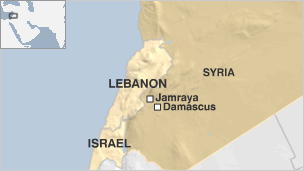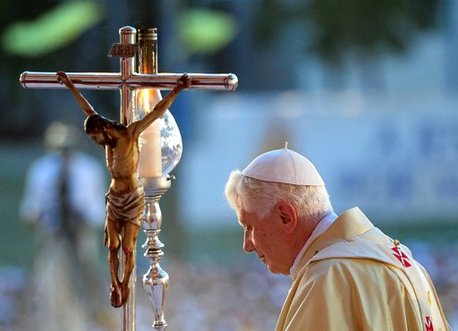Read More [Here]

bbc news
Why would Israel attack Syria?
As the uprising against Syrian President Bashar al-Assad nears its third year, concern has been expressed about the possibility of widespread chaos resulting in the loss of control - or deliberate dissemination - of weapons of mass destruction, such as chemical arms Damascus is said to possess. Israeli Prime Minister Benjamin Netanyahu is reported to have threatened to take action in the event of a loss of control by Mr Assad. Israeli military intelligence is thought to be monitoring the area via satellite for any movement of weapons outside Syria's borders. Israel fears that Syria may unravel in such a way as to seek to destabilise the entire region.
Of particular concern in Israel is Damascus's support for Lebanon's Hezbollah. Israeli officials believe that Hezbollah's arsenal has improved to include thousands of rockets and missiles and the ability to strike almost anywhere inside Israel. A former Israeli intelligence official, Amnon Sofrin, says Hezbollah is known to have been storing some of its more advanced weapons in Syria and will seek to move everything it can into Lebanon. "As soon as these weapons reach Lebanon, they are swallowed up in secret underground stockpiles. Looking for them will be like searching for a needle in a haystack," Israeli defence analyst Alex Fishman said in the Yedioth Ahronoth newspaper. "If chemical weapons are brought into Lebanon, Israel will probably not hesitate - and will attack," Mr Fishman said. Israeli Home Front Defence Minister Avi Dichter said on Tuesday that options to prevent Syria from using or transferring the weapons included deterrence and "attempts to hit the stockpiles".

Rome, Italy, Jan 29, 2013 / 01:15 pm (CNA/EWTN News).- Pope Benedict XVI is having his message for this year's World Day of the Sick published in Arabic for the very first time."The Holy Father probably wants to transmit a message on this day to the Syrian people because it's the first time that his message will be published in Arabic," said Archbishop Zygmunt Zimowski, president of the Pontifical Council for the Pastoral Care of Health Care Workers. The Pope's message, drafted in several languages, is centered on the Good Samaritan. It is titled "Go and you, too, do the same," and was released at a Jan. 29 press conference in Rome.
The World Day of the Sick is observed annually on Feb. 11 for the feast of Our Lady of Lourdes, and this year it will be held at the Marian shrine of Altötting in Bavaria, Germany. "The World Day of the Sick was created by Blessed John Paul II 20 years ago," explained Archbishop Zimowski.
"Pope John Paul II, a suffering man among the suffering, wanted for suffering to be seen close to Jesus Christ, who suffered for us for our salvation," the archbishop reflected. "He wanted that God's people become more sensitive to the sick and the suffering and that those suffering find a deeper meaning to their suffering," he added.
Archbishop Zimowski noted that John Paul II wrote about the Good Samaritan and he taught that “doing good to those who suffer is doing good from one's own suffering.”
Khazen History


Historical Feature:
Churches and Monasteries of the Khazen family

St. Anthony of Padua Church in Ballouneh
Mar Abda Church in Bakaatit Kanaan
Saint Michael Church in Bkaatouta
Saint Therese Church in Qolayaat
Saint Simeon Stylites (مار سمعان العامودي) Church In Ajaltoun
Virgin Mary Church (سيدة المعونات) in Sheilé
Assumption of Mary Church in Ballouneh
1 - The sword of the Maronite Prince
2 - LES KHAZEN CONSULS DE FRANCE
3 - LES MARONITES & LES KHAZEN
4 - LES MAAN & LES KHAZEN
5 - ORIGINE DE LA FAMILLE
Population Movements to Keserwan - The Khazens and The Maans
ما جاء عن الثورة في المقاطعة الكسروانية
ثورة أهالي كسروان على المشايخ الخوازنة وأسبابها
Origins of the "Prince of Maronite" Title
Growing diversity: the Khazin sheiks and the clergy in the first decades of the 18th century
Historical Members:
Barbar Beik El Khazen [English]
Patriach Toubia Kaiss El Khazen(Biography & Life Part1 Part2) (Arabic)
Patriach Youssef Dargham El Khazen (Cont'd)
Cheikh Bishara Jafal El Khazen
Patriarch Youssef Raji El Khazen
The Martyrs Cheikh Philippe & Cheikh Farid El Khazen
Cheikh Nawfal El Khazen (Consul De France)
Cheikh Hossun El Khazen (Consul De France)
Cheikh Abou-Nawfal El Khazen (Consul De France)
Cheikh Francis Abee Nader & his son Yousef
Cheikh Abou-Kanso El Khazen (Consul De France)
Cheikh Abou Nader El Khazen
Cheikh Chafic El Khazen
Cheikh Keserwan El Khazen
Cheikh Serhal El Khazen [English]
Cheikh Rafiq El Khazen [English]
Cheikh Hanna El Khazen
Cheikha Arzi El Khazen
Marie El Khazen